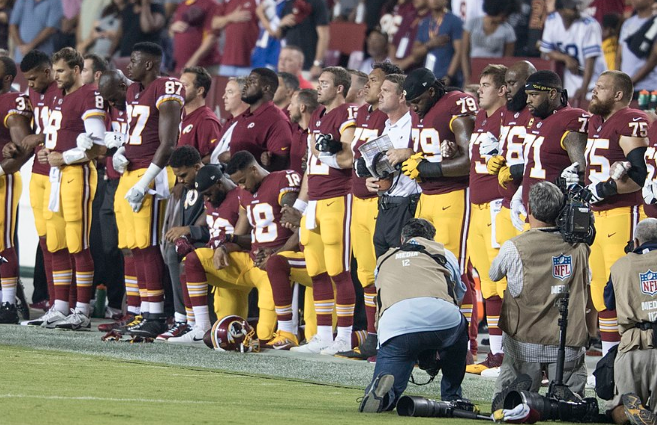
Despite several exciting finishes to football games over the weekend, the big news about the NFL focused on political statements. A coordinated response was repeated across the league in response to President Trump's rampage against players kneeling during the national anthem when he led a campaign rally Friday night in Alabama. The reaction has been well-coordinated and effective. Even Dallas Cowboys owner Jerry Jones took a knee last night with his team, though that was done in unison before the national anthem was played. The message, however, was loud and clear.
Never mind the fact that the U.S. has been coping with four hurricanes, "Rocket Man" in North Korea and stalled legislation in Congress. The president crossed a line, and one of the most enduring brands in the U.S. was not having it. For the NFL, the largely astonished and favorable response to the kneeling and locked arms was a welcome respite from a few years of bad headlines that were tarnishing the league's image: chronic traumatic encephalopathy (CTE) along with the alleged suppression of evidence and an eventual settlement; ties to domestic violence; allegations of dubious charitable work; and of course, the supposed blackballing of Colin Kaepernick, the notorious quarterback and kneeling symbol, who for a while had the top-selling jersey amongst NFL players last year.
While Kaepernick has largely been silent, and for a while was almost forgotten, President Trump's behavior has launched him as yet again a top story, and to some as a martyr. But to the president's supporters, including many NFL fans, Kaepernick's behavior, and now those of many players and personnel, is about disrespecting the flag and the U.S. military.
The truth about the NFL, and its relationship with the U.S. flag and the military, however, is a bit more nuanced.
First, standing on the field for the national anthem was not even a standard practice until 2009. Around that time, the Department of Defense (DoD), during the Obama Administration, mind you, had decided that it would be a good idea to pay teams to have soldiers appear on the field as an effective recruitment tool for the armed forces. The actual amount of money paid varies based on the source. CBS Sports concluded it was $5.4 million to several NFL teams between 2011 and 2015. A report authored by Arizona Republican senators John McCain and Jeff Flake claimed $6.8 million to various teams across the 5 major North American sports leagues from 2012 until last year. The DoD has since ended the practice of paying sports teams for military displays, but both McCain and Flake have inferred that more transparency is needed, and their assessment sounds like a statement that many assume would come from Bernie Sanders's or Nancy Pelosi's offices:
"Despite our success curbing this inappropriate use of taxpayer funds, DOD still cannot fully account for the nature and extent of paid patriotism activities. In fact, more than a third of the contracts highlighted in this report were not included in DOD’s list; instead, our offices discovered the additional contracts through our own investigative work. In the end, two-thirds of the contracts found by our offices or reported by DOD contained some form of paid patriotism."
Senator Flake in particular has harshly criticized the DoD for such spending. In 2015, Flake highlighted what he described as "egregious and unnecessary waste" of taxpayer funds used at New York Jets games to "honor" members of the New Jersey Army National Guard (NJANG).
“This will probably stand as the biggest Draft Day bust for the Jets until 8 p.m.,” sniffed Flake at the time, needling the perennial underachieving Jets as the revelations of the $100,000 the NJANG paid the team occurred during the NFL's annual college athlete draft ritual.
What is true is that even before the DoD and state national guards launched marketing campaigns with the NFL, players always had the option of appearing on the field during the playing of the national anthem. No evidence makes it clear that any pay-for-patriotism programs required players to stand during the anthem. But the optics of the league paying in order to appear patriotic gives notice to these players' harshest critics that they need to take a step back and look this entire controversy in context.
Indeed, the NFL did eventually refund the DoD some of the funds it had taken: Most estimates suggest that the amount was about $724,000. But considering the league has already harvested a reputation as one that fleeces desperate cities in order to retain or lure football teams - $750 million in the case of the Oakland Raiders franchise moving to Las Vegas - the league's willingness to indulge in "paid patriotism" showcases, of course, owners' greed. But this saga also exposes the hypocrisy of those who charge that players who decide to lock arms or take a knee are some how disrespecting the flag or the armed forces - especially since those displays have not been one of tradition, but out of lucrative business contracts.
Image credit: Keith Allison/Flickr

Leon Kaye has written for 3p since 2010 and become executive editor in 2018. His previous work includes writing for the Guardian as well as other online and print publications. In addition, he's worked in sales executive roles within technology and financial research companies, as well as for a public relations firm, for which he consulted with one of the globe’s leading sustainability initiatives. Currently living in Central California, he’s traveled to 70-plus countries and has lived and worked in South Korea, the United Arab Emirates and Uruguay.
Leon’s an alum of Fresno State, the University of Maryland, Baltimore County and the University of Southern California's Marshall Business School. He enjoys traveling abroad as well as exploring California’s Central Coast and the Sierra Nevadas.














